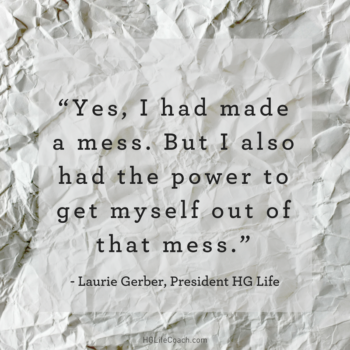Allow me to blow my own horn.
I’ve acted as Co-President and President of HG Life for 12 years. In that time, I’ve coached thousands individuals and couples. I’ve had six-figure sales years. I’ve been quoted in dozens of articles and appeared on TV. I know I’ve fixed hundreds of lives and changed toxic relationships into loving and beautiful ones.
Toot toot.
However, if I, an HG executive, were to claim to be completely perfect, you’d (rightfully) think our company was full of sh-t and not shift.
You see, part of walking our talk at HG is cleaning up our own messes, too. So when I said I blew my own horn above, I meant it in both senses of the word. The good and the bad. Blowing my own horn actually is what blew a relationship that mattered not only a ton to me, but to my company.
So let me start over.
Toxic relationships don’t just exist in the lives of my clients. They are lurking around the edges of my own orbit, too. Recently, I had a big reminder that my executive status doesn’t grant me rights to just do as I please without regard for others.
Enter the BOSS
I found out that one of my company’s partners shudders, scoffs, and smirks (in no particular order) when she gets an email from me. Because in those very emails, I’m always asking her for something.
How did I learn this? Turns out, she had apologetically (and fearfully) mentioned this over drinks with my BOSS. She didn’t want to get me in trouble…
So I got that call. You know. The one from your BOSS. Telling me that we needed to talk. But when your boss is Beth Weissenberger, HG Co-Founder and President of HG Corp, you can bet it’s going to be handled a bit differently.
Beth didn’t yell. She didn’t sugarcoat, either. She said she was dedicated to me and my training, and wanted me to become a better executive. She told me to remember that the feedback she was about to share was being offered in that spirit. And then she told me that this partner thought I was an asshole (scientific term).
Instead of defending myself or justifying my behavior, which would have been understandably human of me, I immediately (okay, maybe not immediately) heard the contribution and saw it as a lesson and an opportunity for growth as a leader, executive, and person.
Schedule a Consultation
Get a feel for how The Handel Method® could benefit your organization.
The lesson learned
My name is Laurie Gerber and I’m a me-aholic.
For some of you that know me me me, you more than likely are not surprised in the slightest by this confession. Long before coaching, I’d excuse my me-ness on being born a twin. You know, it started in the womb where I was taught the fine art of competing. If I didn’t fight and focus on myself, I wouldn’t survive. So, in a way, I had a “doctor’s note.”
(So what if it was an obstetrician’s?) …
But awhile back I gave up that hall pass, rolled up my sleeves, and went to battle with behaviors of mine that were not a match with my dream of who I wanted to be as an executive, let alone, a leader. So, what did I do when Beth gave me this oh-so-embarrassing feedback? Once I got over myself, my initial shame, and my guilt (two very useful emotions, BTW … not!), I did what I have my clients do: attempt to clean up the aftermath of the negative trait.
Cause I’ve learned a secret tool that always helps everyone feel better, and I’ll share it with you. It’s called “coptuitiveness.”
Basically, when you “cop to something,” you admit your wrongdoing. You let go of ego and righteousness. And instead of feeling victimized, hurt, and just plain stressed-out, you feel … well, powerful. Here’s how it plays out:
SCENARIO: Boss (Beth) tells executive (me) that a partner doesn’t care for her style.
BAD COP-TO-IT: Executive huffs and puffs. Begins defending behavior to Boss. “I needed to push! I needed to ask! How else will we ever meet targets? Doesn’t she understand where I’m coming from? Did I tell you about the other deal I landed with so-and-so?”
GOOD COP-TO-IT: Executive sits back in chair. Takes deep breath. Notices feelings of hurt and upswell of internal dialogue (see above). Instead of launching into diatribe (also see above), offers the following: “Ugh. Sounds about right. Clearly not my intent, but she wouldn’t be the first to get left with that feeling about me. That must have been hard for you to hear. And embarrassing. What can I do to fix this?”
You see, when I took a moment to notice my reaction and the way my thoughts were running amuck, I regained my power. Yes, I had made a mess. But I also have the power to get myself out of that mess.
I wrote our partner an apology and once Beth made sure that I FULLY captured what her friend and our partner felt, I sent it.
Excerpts of it are below:
Beth just let me know what you shared with her when you were together and, ugh, am I embarrassed. First, I just want to say I am so so sorry. I am sure you know I’d rather express my regret by phone, so you could hear my sincerity and know in my heart that I know my f up and my negative impact, but I also understand why my behavior makes it so that you wouldn’t want to speak with me.
I understand how you’d feel disinterested in opening yourself up to me when all you’ve experienced is my taking and taking– and denying any role in crappy things that go down. I am further embarrassed to admit you are not the only person who has had this experience of me. It is truly one of my worst and most stubborn traits, that I have not yet killed. I have just finished making an “conceit scale” in my own coaching –that paints the picture in full and gory detail about how selfish and self-serving and intimacy-assuming I can be. You got it full force, repetitively, and I am so sorry for this.
I really also have to thank you for being willing to tell Beth and allowing her to tell me. It is truly a gift to me. It’s the only chance I have to get better and I want you to know that YOU are so worth me getting better for and I am sorry I had to learn this lesson at your expense and that you had to hold onto these feelings as long as you did. I imagine it must have been upsetting–the dissonance you must feel to love the method and the company so much and then to have to deal with someone repetitively who is not walking the talk and not showing care and love.
Please know that this bad behavior was not personal to you (b/c unfortunately it’s a pattern of mine) and you did nothing to deserve it. At the same time, I would love the opportunity to share with you more person to person what I learned about it (I have had some recent insights thanks to you) how sorry I am and figure out a possible way I can make it up to you. I promise I won’t ask YOU for anything other than a chance to do something for you!
Let me know if you are open, but I understand if not.
What you gonna do when they (rightfully) come for you?
So what happened as a result of my coptuitiveness? I never heard from the partner again. J/K! Of course, the partner was as gracious as always. Here was her response:
Thank you for your heartfelt note. Your humility and sincerity is very much appreciated. I know it’s not easy to cop to our demons (unfortunately I know that all too well) but glad you understand that I would do anything for HG, even when it feels sticky. That’s why I shared this with Beth.
No need for a call or to make anything up to me. I hear you and I’m very grateful for your humility and grace.
Now. I wish I could tell you that this behavior will never happen again. I can’t. Truth is, traits are hard-wired. They are never going away. But I can promise you (and all of HG’s partners, affiliates, co-workers, clients, friends, and family) that the leash I have on my horn-blowing self-centered trait has now been shortened. You see. The key to taking on any negative traits that impede our dreams and our ability to lead is to shine a light on them, go public with them, apologize for them, put promises in about them, AND lighten up about them.
Sure, on my path I may trip. We all do. But, regardless, you can count on me always to learn from the fall. How about you you you?
Love,
Laurie
P.S. Interested in coaching for your organization? Contact Beth Weissenberger at beth@handelgroup.com. Or if you want to play a little “good cop-to-it, bad cop-to-it” in the name of personal growth, you’re in luck. SHARE this link with a friend or colleague and you can both download our new free coaching giveaway called How to Have a Difficult Conversation. Get the guidelines for tricky talks in a clear, practical way in this three-page PDF. Get practicing!

